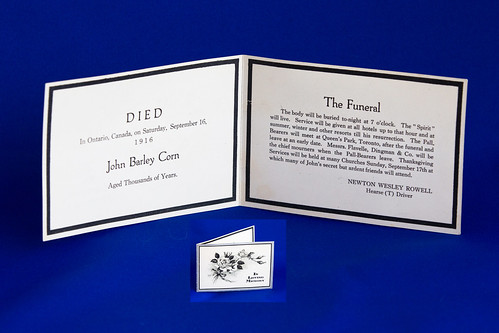This (very old) card belonged to Arch P and seems like a good way to mark the anniversary of the ending of prohibition. Some Background can be read here
In Loving Memory
Died
In Ontario, Canada, on Saturday, September 16th,
1916
John Barley Corn
Aged Thousands of Years.
The body will be buried to-night at 7 o'clock. The "Spirit" will live. Service will be given at all hotels up to that hour and at summer, winter and other resorts till his resurrection. The Pall.Bearers will meet at Queen's Park, Toronto, after the funeral and leave at an early date. Messrs. Flavelle, Dingman & Co. will be the chief mourners when the Pall-Bearers leave. Thanksgiving Services will be held at many Churches Sunday, September 17th at which many of John's secret but ardent friends wil attend.
Hearse (T) Driver

http://www.civilisations.ca/cmc/exhibitions/hist/medicare/medic-1k08e.shtml
ReplyDeleteNewton Rowell
Born near Arva, Ontario, Newton Wesley Rowell (1867–1941) was a lawyer, politician and judge. He led the Ontario Liberal Party from 1911 to 1917, and became known for his commitment to Prohibition and urban reform. Rowell’s strong support of conscription led him to campaign for it in 1917, and he served in Prime Minister Borden’s Cabinet from 1917 to 1920. In 1919, when Rowell introduced the act to create the federal Department of Health, he stated: “This Bill is of very great importance. It is not a new departure in the sense of the Federal Parliament legislating on public health; ever since Confederation we have legislated on various aspects of the question. But it is a new departure in the emphasis which it places upon the conservation of the health of the people and upon their social welfare” (Canada, House of Commons Debates, Hansard [April 4, 1919], pp. 1174–75). On July 1, 1919, Rowell became the first federal Minister of Health and moved swiftly to focus attention on creating the Dominion Council of Health and organizing his department’s activities. However, Rowell left Parliament in 1921 and returned to law, becoming President of the Canadian Bar Association in 1932 and Chief Justice of Ontario in 1936. In 1937, he was appointed to chair the Royal Commission on Dominion–Provincial Relations to study “the economic and financial basis of Confederation and the distribution of legislative powers in light of the economic and social developments of the last seventy years” (John L. Finlay and Douglas N. Sprague, The Structure of Canadian History [Scarborough, Ontario: Prentice-Hall Canada Inc., 2000], p. 401). Although Rowell had to resign from the commission in 1938 due to ill health, his advocacy of government support for health care contributed to the creation of medicare.